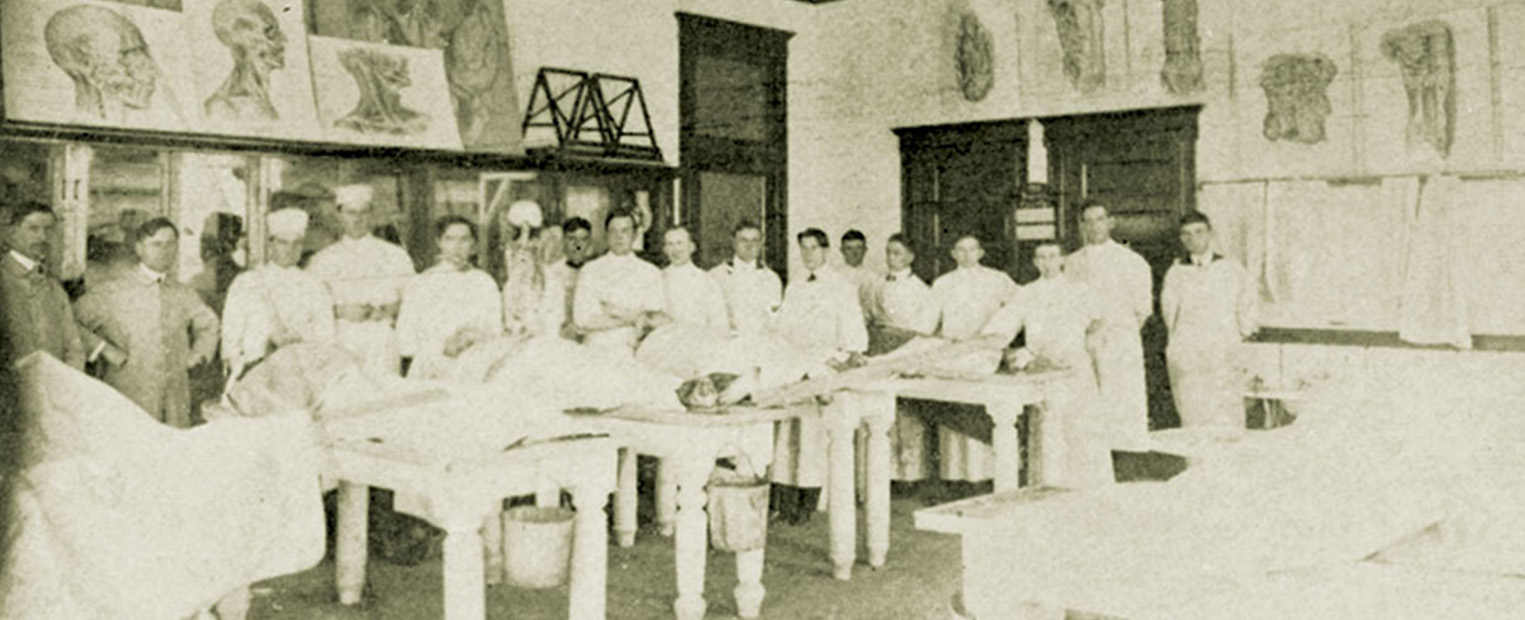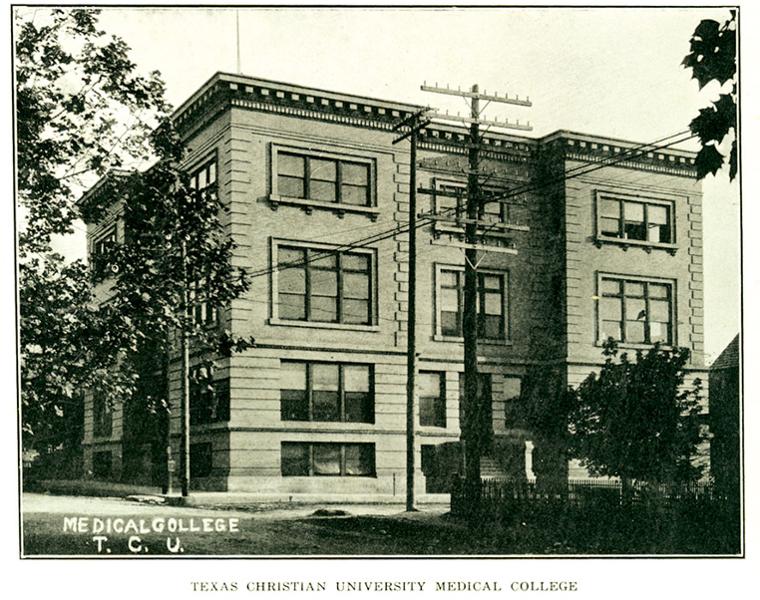As TCU wraps up its sesquicentennial festivities, one of its prominent institutes hits a major milestone.
For 110 years, the Pre-Health Professions Institute, part of TCU’s College of Science & Engineering, has prepared students for post-graduate schools through rigorous academic curriculum, extensive connections with the regional healthcare community, one-on-one academic advising from committed faculty mentors, and a wealth of student activities. As a significant point of pride, TCU’s Pre-Health Professions program boasts above an 80% acceptance rate to medical school, which is twice the state and national averages. Matt Chumchal, director of the Pre-Health Professions Institute, says, "The Pre-Health Program has been an integral part of the TCU community for over a century, and we are proud to celebrate our 110th anniversary the same year TCU turns 150."
While medical school is the most common destination for Pre-Health graduates, it’s not the only one. Alumni pursue a variety of health professional programs and eventually begin careers as dentists, physician assistants, veterinarians, optometrists, pharmacists, and podiatrists. As part of TCU’s sesquicentennial celebration, the University highlighted significant Horned Frog alums with a series of hand-painted murals in cities across the country. The murals were part of TCU’s national brand campaign “Lead On: Celebrating 150 Years of TCU,” and they epitomize the university’s mission and pledge to create leaders who are conduits for the greater good. Three extraordinary health care professionals that were the product of the Pre-Health Professions Institute were featured on a larger-than-life mural in downtown Chicago.
Brandon Zsigray ’14 graduated from TCU’s College of Science & Engineering after completing his undergraduate work in its Pre-Health Professions Institute. Following medical school in 2018, Zsigray became a neurosurgery resident at Loyola Medicine in Chicago. He says his time at TCU prepared him for his path to become a surgeon. “From day one, you’re exposed to research opportunities and very much encouraged to partake in them, especially as part of the pre-health track…they really encouraged us to get involved with physician shadowing as an opportunity to see what a medical career really meant,” Zsigray says.
Completing her undergraduate work a few years after Zsigray in the Pre-Health Program, Courtney Sullivan ’17 graduated from Baylor College of Medicine and began her residency at the University of Chicago Medicine in obstetrics and gynecology. She says that the academic rigor of TCU prepared her well for the challenges of medical school. “Medical training is obviously a very long road, and it's very hard. The College of Science & Engineering does not make its classes easy…You can really tell that your professors want to push you and want to make you a better student,” Sullivan says. Sullivan has done a lot of advocacy work in medical school for reproductive justice among marginalized populations. She credits TCU with helping her grow in confidence and shaping her into the leader she is today.
McKenna Chalman ’19 also went through the Pre-Health Program and was a 2023 graduate of the inaugural class of the TCU Burnett School of Medicine. Chalman is completing her general surgery residency at Rush University in Chicago. She says, “Being a part of the first class at TCU’s Burnett School of Medicine has been wonderful. I look at my classmates and see where everybody else is going to residency and all the success that they have had, and I can't believe that I get to be a part of that too. Of those that applied to residency this year, 100% of us were matched. That's phenomenal and exciting, and now we get to kind of scatter and continue our training and represent TCU as we do that.”
The Pre-Health Professions Institute differentiates itself from programs at other universities in its highly tailored approach. Chumchal notes, "Since the beginning, the Pre-Health Program has been characterized by an innovative and personalized approach that puts our students at the center of everything we do.” In the past 10 years, the Institute has expanded its opportunities for students by incorporating coursework focused on professional development in a student’s first, second and final year that helps them navigate the challenging requirements of this path. The Institute has also developed the Cultural Awareness in Healthcare minor, which helps students explore the impact of society and the cultural, social, and ethical issues that have implications in medicine, and is now one of the most popular minors in CSE.
Almost half of the committee that advises Pre-Health students has been doing so for more than a decade. This longevity translates into a tremendous level of institutional knowledge and great working relationships with many of the health professions programs in the region. Chumchal says, “Our advisors have an open-door policy and care deeply about their students. Committee members help students select courses and assess each student’s academic progress at least once a semester. In addition, faculty members provide counseling regarding the health professions and evaluate, both for the student and for the professional schools, the student’s suitability for entering the profession.” Before applying to professional school, students undergo mock interviews with faculty and local health care providers to prepare for the interview process.
TCU is committed to the teacher-scholar model in which faculty both teach and conduct original research. This means that faculty are experts in their disciplines, bringing cutting-edge information into the classroom. This model also provides undergraduate students with a unique opportunity to participate in research with faculty at a rate not possible at larger schools.
Exposing students to real-world medicine remains an important goal of the Pre-Health Professions Institute. The Institute is well-connected to the healthcare community in Fort Worth and beyond. Students administer a health care observation program that provides access to over 20 clinics and hospitals where students observe doctors, dentists, and physician assistants while also interacting with patients. The Pre-Health Program offers internships at several venues: a local hospital emergency department, a fetal care center, a cancer institute, and a free clinic for the medically underserved.
EPIC (Experiential Projects to Impact the Community) Grants are awarded annually to support Pre-Health student-led projects that benefit communities locally and on TCU's campus. These grants foster a culture of giving and provide students with opportunities to develop cultural humility, teamwork, and leadership skills. Additionally, several health-related clubs and organizations provide students with the opportunity to get to know their classmates, and the Institute hosts several social activities for its students each year including a tailgate during Family Weekend, white elephant gift exchange, and an end-of-the-year BBQ.
These strengths have helped the Pre-Health Professions Institute attract top students. Pre-Health students comprise 21% of the Chancellor’s Scholars and 22% of the students in the Honors College. Each year, the Institute advises approximately 1,000 students who must complete a demanding curriculum including at least two years of coursework in biology and chemistry and one year of physics coursework.
Another innovative addition to the Pre-Health program is the Narrative Medicine Listening Project. Its purpose is to prepare future physicians and healthcare providers to become thoughtful practitioners by directly listening to the lived illness stories of current and former patients and their loved ones. Students grow in their capacity to practice empathy, compassion, acknowledgement, and thoughtful listening. Looking ahead, the Pre-Health Professions Institute will continue to focus on new initiatives to broaden its curriculum and foster new programs that promote leadership, service, cultural humility, and a sense of belonging.
“Healthcare is rapidly changing - and along with it, the training and support pre-professional students need to be successful. Over the next 150 years, the Pre-Health Professions Institute looks forward to providing students with a strong foundation as they begin their journey to become empathetic healthcare leaders," Chumchal says.
Learn more about CSE’s Pre-Health Professions Institute.

